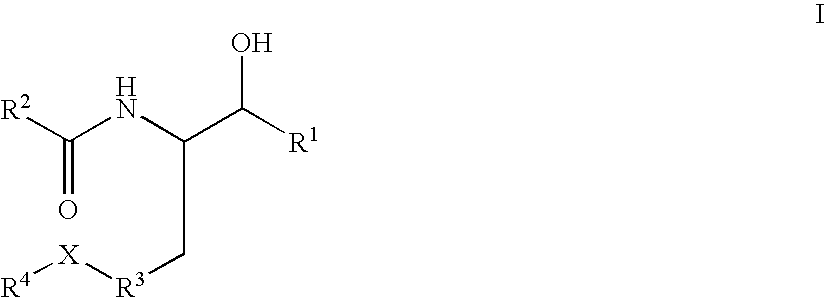Substituted amide beta secretase inhibitors
a technology of amide beta secretase and inhibitor, which is applied in the direction of biocide, heterocyclic compound active ingredients, drug compositions, etc., can solve the problem of not preventing disease progression
- Summary
- Abstract
- Description
- Claims
- Application Information
AI Technical Summary
Benefits of technology
Problems solved by technology
Method used
Image
Examples
example 1
PREPARATIVE EXAMPLE 1
[0264]
[0265]
[0266]To an ice-cold solution of Boc-L-3-bromophenylalanine (9.44 g, 27.4 mmol) in toluene (60 ml) and MeOH (12 ml) was added 2M (trimethylsilyl) diazomethane in hexanes (20 ml). The solution was stirred at RT for 1 h and AcOH (2 ml) was added. The mixture was concentrated and the residue was dissolved in 20% MeOH / CH2Cl2 (40 ml). The solution was cooled in an ice-water bath and 4N HCl / dioxane (36 ml) was added via dropping funnel over 30 min. After the addition was complete, the mixture was warmed to RT and stirred for 4 h. The mixture was concentrated to give the product (8.95 g, 100%). MS m / e 258 (M+H)+
[0267]
[0268]To a solution of the product of Step 1 (8.95 g, 27.4 mmol) in THF (80 ml) and DMSO (20 ml) were added sodium bicarbonate (14.6 g, 174 mmol) and benzyl bromide (15.9 g, 91.4 mmol). The mixture was stirred at 80° C. for 24 h. The mixture was cooled to RT and water (120 ml) and EtOAc (100 ml) were added. The aqueous layer was extracted with ...
example 2
PREPARATIVE EXAMPLE 2
[0288]
[0289]
[0290]To a solution of 1,3-dibromo-5-fluorobenzene (5.105 g, 20.11 mmol) in ether (50 ml) in a dry ice-acetone bath was added 1.6M butyllithium in hexanes (12.5 ml, 20.0 mmol). After 2 h benzaldehyde (2.287 g, 21.55 mmol) was added and the mixture was allowed to warm to RT slowly and stirred for 16 h. The reaction was quenched with brine (70 ml) and the aqueous layer was extracted with ether (50 ml). The combined organic layer was dried (MgSO4), concentrated, and purified by column chromatography (gradient EtOAc / Hexanes 0-10%) to give the product (5.036 g, 90%). 1H-NMR (CDCl3): δ=7.30 (m, 6H), 7.09 (m, 1H), 7.02 (m, 1H), 5.73 (s, 1H).
[0291]
[0292]To a solution of the product of Step 1 (5.036 g, 17.92 mmol) in CH2Cl2 (70 ml) was added triethylsilane (12.0 ml, 74.3 mmol). The solution was cooled in an ice-water bath and boron trifluoride diethyl etherate (3.35 ml, 26.7 mmol) was added. The mixture was slowly warmed to RT and stirred for 5 h. The reactio...
example 3
PREPARATIVE EXAMPLE 3
[0315]
[0316]
[0317]A solution of (S)-m-cyanophenylalanine (5.00 g, 26.3 mmol) and potassium carbonate (14.5 g, 105 mmol) in water (50 ml) was heated to reflux. Benzyl bromide (10.4 ml, 86.8 mmol) was added dropwise. After 1 h additional benzyl bromide (1.50 ml, 12.5 mmol) was added and the mixture was refluxed for 1 h. The mixture was cooled and extracted with ether (2×300 ml). The combined organic layer was washed with saturated NaHCO3 (100 ml) and brine, dried (MgSO4), concentrated, and purified by column chromatography (gradient EtOAc / Hexanes 0-10%) to give the product (10.9 g, 90%). MS m / e 461 (M+H)+
[0318]
[0319]To a solution of the product of Step 1 (2.30 g, 4.99 mmol) in THF (25 ml) in a dry ice-acetone bath was added 1M LiAlH4 in THF (10.0 ml) slowly and the mixture was stirred for 3.5 h. The reaction was quenched with saturated NH4Cl (15 ml) and extracted with ether (2×100 ml). The combined organic layer was washed with brine, dried (MgSO4), and concentrat...
PUM
| Property | Measurement | Unit |
|---|---|---|
| pH | aaaaa | aaaaa |
| total volume | aaaaa | aaaaa |
| total volume | aaaaa | aaaaa |
Abstract
Description
Claims
Application Information
 Login to View More
Login to View More - R&D
- Intellectual Property
- Life Sciences
- Materials
- Tech Scout
- Unparalleled Data Quality
- Higher Quality Content
- 60% Fewer Hallucinations
Browse by: Latest US Patents, China's latest patents, Technical Efficacy Thesaurus, Application Domain, Technology Topic, Popular Technical Reports.
© 2025 PatSnap. All rights reserved.Legal|Privacy policy|Modern Slavery Act Transparency Statement|Sitemap|About US| Contact US: help@patsnap.com



